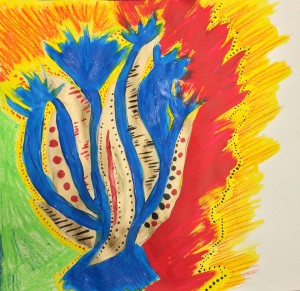Title of Painting: “JOY!”
© E. Hitchcock Scott, PhD, 2015
Clients and patients arrive for addiction treatment seeking help, relief, and rescue. This is understandable, the pain and consequences of addiction are great. Even if a person has been admitted to treatment at a young age, or at a very early stage of addiction, the emotional pain underneath the chemical abuse can be overwhelming and crippling.
Upon admission to treatment I ask a new person, “What do you want to create with your life?” I ask this question to help anchor and couple sobriety with future dreams and visions. I ask this question because clients can become easily confused about the goals of recovery. The problem with a goal that is unattainable or mythological is that failure to meet that goal, even a false goal, can be a set up for relapse.
Early in sobriety I often hear this response to my question, “I just want to be happy,…. can’t I just be happy?” I have heard this statement spoken as a lament and a complaint, as if to suggest that life is inadequate. More than once I have said to various clients, “If you are sitting in a room with a view of the ocean, and you are not happy, what will it take for you to become happy? Items I have heard listed as a requirement for happiness may include the wish for more – alcohol, drugs, possessions, freedom, or sex.
Happiness, as a form of self-serving satisfaction is fleeting, as fleeting as: a shot of Tequila tipped back and gulped, a prick of the needle on skin, the ding of a cash register after a new purchase, a roll of dice, the afterglow of sex with an exotic stranger, a quart of ice cream…. and therefore happiness is addictive. This form of happiness, versus joy, sells products, but it does not bring peace.
Joy is not dependent upon an external circumstance, substance or object. Joy cannot be manipulated. Joy emerges from deep inside of our core selves. Joy surfaces when we feel connected to another human being (without expectation), a higher power, nature, beauty, and/or our souls’s destiny. Joy is ethical, happiness,…. maybe not so much.
I do not believe I have ever heard anyone express guilt or shame after feeling joy, instead I hear descriptions of awe, a sense of wonder, or gratitude.
Yet feelings of shame, disgust, fear, terror, angst, guilt, remorse, and even horror can follow seconds, even milliseconds, after attaining moments of happiness. The half life of happiness is short which exacerbates the addictive potential.
There are many pathways to happiness and joy. One surprising pathway to joy is – truth telling – in the counseling setting. No matter how difficult it is to tell the truth, and even painful at first, telling the truth opens the door to joy.
Joy may be foreshadowed or revealed in an art piece or poem, before it has fully emerged into consciousness. A client’s awareness of joy may be simple at first, “Oh, I am using so much more color now,” or “My painting looks more playful than in the past”.
After processing and releasing trauma, grief and loss, there is now room in the psyche for joy, peace and self-love.
As people begin to feel and express joy, they tend to parallel process self-love, “I never knew I mattered until this minute”, or “I never felt love for myself until today”.
Joy arrives with the birth of self.

